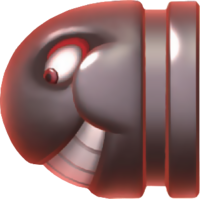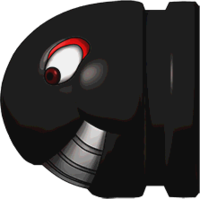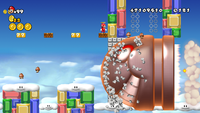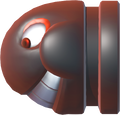King Bill: Difference between revisions
LinkTheLefty (talk | contribs) mNo edit summary |
|||
| Line 14: | Line 14: | ||
====''New Super Mario Bros. Wii''==== | ====''New Super Mario Bros. Wii''==== | ||
[[File:NSMBW World 9-8 Screenshot.png|thumb|200px|left|A screenshot of a King Bill in its first game appearance, ''New Super Mario Bros. Wii'']] | [[File:NSMBW World 9-8 Screenshot.png|thumb|200px|left|A screenshot of a King Bill in its first game appearance, ''New Super Mario Bros. Wii'']] | ||
There are a total of seven King Bills in ''[[New Super Mario Bros. Wii]]'', all of them appearing exclusively in [[World 9-8 (New Super Mario Bros. Wii)|World 9-8]]. Incoming King Bills are signaled in the form of [[coin]]s shaped like a bullet. King Bills are invincible and cannot be defeated, and touching a King Bill deals damage; they must be avoided by bouncing above them with clouds or avoiding their paths, though they can be removed from the screen by jumping on the [[Goal Pole|flagpole]]. | There are a total of seven King Bills in ''[[New Super Mario Bros. Wii]]'', all of them appearing exclusively in [[World 9-8 (New Super Mario Bros. Wii)|World 9-8]]. Incoming King Bills are signaled in the form of [[coin]]s shaped like a bullet. King Bills are invincible and cannot be defeated, and touching a King Bill deals damage; they must be avoided by bouncing above them with clouds or avoiding their paths, though they can be removed from the screen by jumping on the [[Goal Pole|flagpole]]. Having a star prevents damage from a King Bill. King Bills destroy most other blocks in their path, such as [[Empty Block]]s, [[? Block]]s, and [[Brick Block]]s; one of the [[Star Coin]]s in the stage can only be obtained after some King Bills have run through the stone blocks surrounding them. | ||
Unused animation files found within ''New Super Mario Bros. Wii'' suggest King Bills were [[List of New Super Mario Bros. Wii pre-release and unused content#Enemies|originally]] going to be able to be defeated by another method, though it was later reused in ''[[New Super Mario Bros. U]]'' and ''[[New Super Luigi U]]'', but only in the original iterations. | Unused animation files found within ''New Super Mario Bros. Wii'' suggest King Bills were [[List of New Super Mario Bros. Wii pre-release and unused content#Enemies|originally]] going to be able to be defeated by another method, though it was later reused in ''[[New Super Mario Bros. U]]'' and ''[[New Super Luigi U]]'', but only in the original iterations. | ||
Revision as of 15:12, October 24, 2024
- This article is about gigantic Bullet Bill variant. For the red Banzai Bill that originally had the same name, see Bull's-Eye Banzai.
| King Bill | |||
|---|---|---|---|
 Artwork from New Super Mario Bros. Wii | |||
| First appearance | New Super Mario Bros. Wii (2009) | ||
| Latest appearance | New Super Mario Bros. U Deluxe (2019) | ||
| Variant of | Bullet Bill | ||
| |||
King Bills are giant variants of Bullet Bills that first appear in New Super Mario Bros. Wii. They take up nearly the entirety of the screen's vertical space even after it has been zoomed out to accommodate them. They are gray with a large jovial grin as opposed to the menacing grin of other Bullet Bills, and are relatively short lengthwise, similarly to the original sprites of both Bullet Bills and Banzai Bills; their eyes typically follow the movements of the player's character(s). Unlike the other varieties of Bullet Bills, King Bills are always fired from offscreen areas.
A larger version of the Banzai Bill exists in prototypical data for Super Mario World, and would have predated the King Bill had it been incorporated in the final game.
History
Super Mario series
New Super Mario Bros. Wii
There are a total of seven King Bills in New Super Mario Bros. Wii, all of them appearing exclusively in World 9-8. Incoming King Bills are signaled in the form of coins shaped like a bullet. King Bills are invincible and cannot be defeated, and touching a King Bill deals damage; they must be avoided by bouncing above them with clouds or avoiding their paths, though they can be removed from the screen by jumping on the flagpole. Having a star prevents damage from a King Bill. King Bills destroy most other blocks in their path, such as Empty Blocks, ? Blocks, and Brick Blocks; one of the Star Coins in the stage can only be obtained after some King Bills have run through the stone blocks surrounding them.
Unused animation files found within New Super Mario Bros. Wii suggest King Bills were originally going to be able to be defeated by another method, though it was later reused in New Super Mario Bros. U and New Super Luigi U, but only in the original iterations.
The Prima Games guide for this game uses the term "King Bill" as a catch-all for any large Bullet Bill variations, as in addition to this specific enemy,[1] it was also applied to Banzai Bill[2] and its homing variant.[3] This is not the case in later appearances.
New Super Mario Bros. U / New Super Luigi U / New Super Mario Bros. U Deluxe
King Bills reappear in New Super Mario Bros. U, with five of them appearing solely in the level Flight of the Para-Beetles. They retain most of their behavior from New Super Mario Bros. Wii, including the bullet-shaped groups of coins that signal them. However, King Bills are also enveloped in yellow flames similar to that of Mad Banzai Bills; they also move at a slower speed, and exclusively in the original iteration, can be defeated using the Boost Star in Boost Mode. In New Super Luigi U, King Bills first appear at Larry's Trigger-Happy Castle, chasing after the player(s) as they head to the boss door; they are also seen in Para-Beetle Parade. Compared to New Super Mario Bros. U, the King Bills in New Super Luigi U move at a faster speed. In New Super Mario Bros. U Deluxe, King Bills retain their role from both games.
Puzzle & Dragons: Super Mario Bros. Edition

King Bills are one of the various enemies that the player can come across in Puzzle & Dragons: Super Mario Bros. Edition. Its main attribute is Dark, while its sub-attribute is Fire. When fought as an enemy, the King Bill always starts off by delivering a first strike attack. It then attacks every two turns. When the King Bill does make a move, it might increase its ATK before attacking the player. The King Bill's Active Skill can lower the defense of all enemies to 0 for one turn, while its Awoken Skill raises the ATK of the player's team members. King Bill's greatest stat is its ATK, while it has average HP, and an abysmal RCV.
The player can transform a Banzai Bill into a King Bill by giving it 6 Fire Flowers.
Profiles and statistics
New Super Mario Bros. Wii
- Trading card description: Here comes king-sized destruction. King Bills are gigantic bullets that come flying across the screen destroying everything in their paths. They are totally invincible to any weapons or maneuvers used against them. The best plan is to stay out of their path. Star power will help keep Mario protected in case of a run in but it won't hurt King Bill.
Card number: 39 (Normal), F21 (Silver)
Gallery
Model from New Super Mario Bros. U
Names in other languages
| Language | Name | Meaning | Notes |
|---|---|---|---|
| French | Roi Bill Balle[4] | King Bullet Bill | |
| German | König Kugelwilli[?] | King Bullet Bill | |
| Italian | King Bill[5] | - | |
| Re Pallottolo Bill[?] | King Bullet Bill | ||
| Spanish | Rey Bill Bala[?] | King Bullet Bill |
References
- ^ Bueno, Fernando (2009). New Super Mario Bros. Wii PRIMA Official Game Guide. Prima Games (American English). ISBN 978-0307465924. Page 189.
- ^ Bueno. New Super Mario Bros. Wii PRIMA Official Game Guide. Page 16, 138, 142.
- ^ Bueno. New Super Mario Bros. Wii PRIMA Official Game Guide. Page 179.
- ^ Screenshot (JPG). SuperSoluce (French).
- ^ New Super Mario Bros. Wii - Album ufficiale. Page 16.



